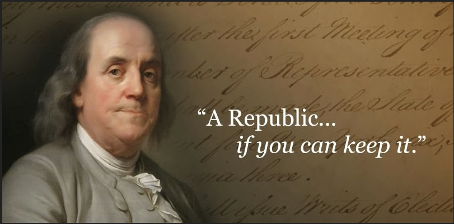WAIT Blogs
A republic
9/4/20242 min read


"A Republic, If You Can Keep It" - Benjamin Franklin
Describing our current political situation and the state of the world without resorting to clichés is a challenge. Since the onset of the coronavirus pandemic, much has appeared nonsensical. To say that everything seems upside down may be the most accurate description.
When WAIT was developed at the end of 2020, its main purpose was to “make sense of the nonsensical” in psychological terms. It sought to answer this question: What must be true for politicians and other establishment figures to act in seemingly irrational ways while maintaining a facade of rational behavior?
Nearly four years later, WAIT's search for answers is joined by millions of others seeking to answer similar questions. A disturbing picture has emerged—one that is denied, ignored, or ridiculed by those who may have a vested interest in maintaining the status quo.
What has been meticulously prepared for more than a century is now unfolding before our eyes: a slow coup d'état orchestrated by a small elite determined to introduce a new system of governance—a "new world order." This concept has long been dismissed as a conspiracy theory, but the signs are everywhere, and the goal is clear: the historic Westphalian principle of national sovereignty must be uprooted. For a global governance system to emerge, the independence of nation-states must be abolished, which can only be achieved through massive chaos and destruction, beginning with democracy itself.
When famously asked what kind of government the newly formed United States would have, Benjamin Franklin replied, "A Republic, if you can keep it." This statement captures the essence of America's founding vision: maintaining a democratic republic requires constant vigilance, active participation, and commitment from its citizens. Franklin's warning was a reminder that these principles are not self-sustaining; they demand the ongoing engagement and dedication of the people to preserve and protect the Republic. As our own institutions are increasingly compromised, Franklin's warning rings truer than ever.
To counter these undemocratic forces, WAIT aims to unify people around principles that are both universal and non-controversial: individual sovereignty and human rights. By focusing on these fundamental concepts, we propose a way to organize people internationally outside the current political paradigm. WAIT represents both a philosophical and practical strategy for reclaiming political power and advocating for a decentralized governance structure that prioritizes individual and national sovereignty.
To achieve this, an essential amendment to Article 29 of the Universal Declaration of Human Rights (UDHR) is necessary. This historic document holds decisive practical significance. Currently, the formulation of human rights in the UDHR implies a hierarchical relationship where these rights are perceived as subservient to the document itself. Our proposal seeks to address this fatal flaw by ensuring that human rights are framed in a way that prioritizes the inherent dignity and autonomy of every individual, placing them above any institutional or document-based authority.
We advocate for the elevation of individual sovereignty, arguing that people must be recognized as the highest unit of value under God. We are humans first and citizens second, and this should be firmly expressed in our constitutions and treaties. This realignment of the hierarchy ensures that institutions serve humanity, not the other way around.
WAIT